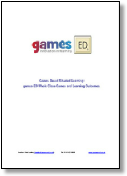
© Paul Ladley 2011.

Simulations and Games Based Learning
In addition to ‘page turning’ e-
Learning simulations are fun and get everyone involved. Players make decisions and get immediate feedback, allowing them to quickly build up subject understanding. Within the context of authentic (situated) and collaborative experience, they also develop soft skills
I believe the most important aspect of the learning approach is that the simulations provide an anchor for conversations among team mates, across teams, and at a group level mediated by the facilitator. Learning simulations create dialogue and build relationships.
I have redeveloped learning simulations for use in education. I blog regularly at
www.games-
Planet-Shared
Planit-
Delegates are split into teams to play the roles in a virtual organisation. The the delegates do not use the computer; instead they use worksheets to make decisions.
The learning simulation is run over three to four rounds (simulated years). The workshop runs over the course of a day.
Each round is split into 3 phases (Plan > Do > Review):
1. State of play -
2a. Make purchase decisions -
2b. Input the purchase decisions -
3. Review what happed and deal with any incidents -



Planit-
